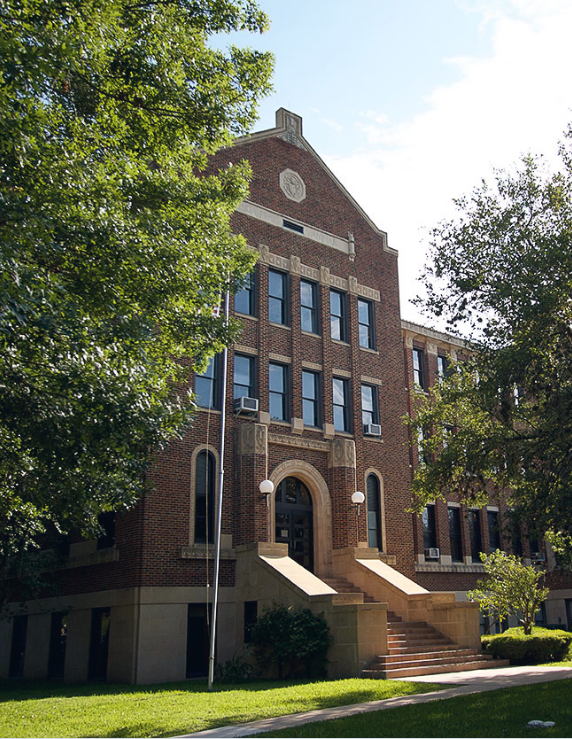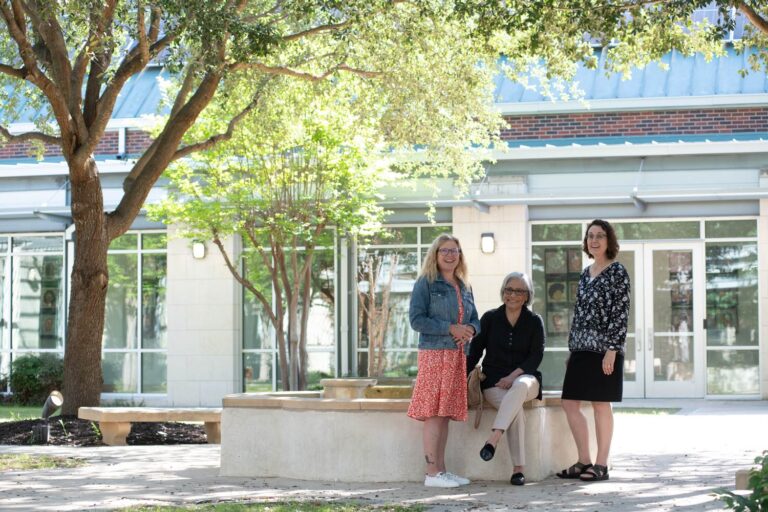Oblate School of Theology awarded 10 Master of Arts (Spirituality), one Master of Arts (Theology), five Master of Arts in Pastoral Ministry, eight Master of Divinity, one Doctor of Ministry and two honorary doctoral degrees during its 2017 Commencement exercise May 5 in the Immaculate Conception Memorial Chapel.
The Master of Arts (Spirituality) was conferred on James Mark B. Adame, Donald Bassana, Jr., OFM Conv., Misty Kay Garriga, Julia E. Hinojosa, Leticia Givilancz Long, Lucie Thérèse Luduc, Kathleen Ann O’Connor, Glenda Margaret Prosser, Carol H. Solis and Daniel E. Villarreal Paez.
Patrick Neil Bastien was awarded the Master of Arts (Theology). The Master of Arts in Pastoral Ministry was conferred on Duncan Amek, Rosa K. Hawthorne, Cheryl Lynn McMullan, William Douglas Neel and Vincent Wambugu.
Receiving the Master of Divinity were Edgardo Diaz Vazquez, OFM, Heleodoro Lozano Macias, Juan Mercado, Pedro Mercado Jr., Fidel Valdez Rivero, Abel E. Ruiz, Daniel E. Villarreal Paez and Cong Chi Vo.
Neil Andion Arce received the Doctor of Ministry.
Javier Gonzalez Cabrera and Daniel E. Villarreal Paez completed the Baccalaureate in Sacred Theology. This degree, offered through an affiliation with Saint Paul University in Ottawa and accredited by the Vatican’s Congregation for Catholic Education, will be conferred at a later date.
Nine seminarians – Duncan Amek, Edgardo Diaz Vazquez, OFM, Heleodoro Lozano Macias, Juan Mercado, Pedro Mercado Jr., Fidel Valdez Rivero, Abel E. Ruiz, Daniel E. Villarreal Paez and Cong Chi Vo – also were awarded the Certificate of Advanced Studies for Presbyteral Ministry.
Father Bryan Massingale, professor of theological and social ethics at Fordham University, received an honorary Doctorate of Humane Letters. He also was OST’s Commencement speaker. Sister Jane Ann Slater, CDP, the Archdiocese of San Antonio’s first woman chancellor, received an honorary Doctorate of Pastoral Leadership and gave the invocation.
In his address, Fr. Massingale said that the November 2016 election revealed a nation “where truth is confused and manipulated, where folks on all sides of the political spectrum throw accusations of ‘fake news’ and ‘alternative facts’ at one another, and where playing loose with reality – or as my grandmother would say, ‘just plain lyin’ – has become commonplace in our common life.”
It also revealed a fearful nation, he continued. Women fear for the respect of their bodies; gays, lesbians and transgender people for protection of their rights; blacks fear official misconduct; immigrants fear for the integrity of their families, Muslims for the protection of their lives, Jews for the sanctity of their synagogues and cemeteries, the sick for access to affordable, quality health care, and working-class whites for security in the face of downward mobility and increasing class disparity.
Yet, in Massingale’s view, perhaps the most important revelation in the election was that Americans are deeply divided – and not only by fissures of race, class, ethnicity, gender, geography, religion, essential identities and expressions.
“We are separated by chasms of understanding. Those who differ from us seem increasingly alien and incomprehensible,” he asserted. We have become a nation of strangers, siloed in racial, geographic, media and digital enclaves where we mostly interact with those who are like us – who think like us, act like us, sound like us, vote like us, love like us and pray like us.”
This isolation fuels ignorance, indifference and fear, which become the fertile soil for moral callousness and disregard for those who are not like us, the priest observed. He cited the vitriol of public discourse, a spike in hate crimes and “a callousness and even cruelty toward those not like us,” which he said “disturbs me and fills me with dread.”
The professor reminded listeners that Christian Scripture summons us to love our neighbor, care for the stranger and show one another the compassion that God has for us. “Our sacred texts tell us bluntly that we are our brother’s keeper; they warn us that our response to ‘the least among us’ – especially those not like us – is the measure of our holiness and righteousness: ‘For I was hungry and you gave me to eat; thirsty and you gave me to drink; naked and you clothed me; a stranger and you welcomed me,’” he said, quoting from the Gospel of Matthew.
Healing this national estrangement and preaching and ministering to this deeply confused, fearful and divided nation are perhaps the greatest challenges facing ministers of the gospel today, Fr. Massingale warned graduates. “St. John Paul II reminded us that one of the most important challenges facing a society is how we live together. Healing will not come from facile appeals for unity, and even less from a dismissive attitude such as ‘After all, elections have consequences; we won, get over it!’”
Living together in harmony requires cultivation of public compassion, “which demands, at the very least, decency and respect for those who are not like us,” the priest commented. Ministers must be close to those in their care and know their fears and anxieties. It is by listening to people – especially to those not like us – that we show that our God is close to our fears. In a nation confused about truth, he observed, a prophetic voice “proclaims the truth of the equal, sacred human dignity of all God’s people. This is the foundation of Catholic social teaching.” In today’s language, he continued, “unborn lives matter, women’s lives matter, Muslims’ lives matter, immigrants’ lives matter, and yes, black lives matter. We must be forthright and declare that fear is no excuse for hate. As Jesus did for the woman caught in adultery, we must be willing to be ‘stone-catchers’ for those most endangered by our collective fear.”
Finally, he warned that a joyful witness means “not a sappy reassurance of a shallow optimism that ignores hard and difficult times; we offer the joy that comes from deep, contemplative prayer, because in such prayer, we become one with Christ, who came that his joy may be ours and our joy may be complete.”
Fr. Massingale cited Pope Francis’ summons to be joyful witnesses inspired by the message of the Resurrection, which does not deny the reality of the Crucifixion or gloss over suffering and death, but proclaims that human sin and tragedy are not the final word and that God and Jesus’ disciples can bring good out of human callousness and evil. “That’s the joy we proclaim and that’s the joy they desperately need,” he said
The theologian, the first in his extended family to graduate from college, ended by recalling how his grandmother savored the rich, smooth feel of his college diploma.
“She took her Bible seriously, especially the admonition that ‘to those to whom much is given, much will be required.’ She didn’t have money to buy me a gift, but her question to me was both a haunting challenge and yet the most loving gift she could have given me,” he recalled. She asked, “Whom are you going to use this for? Whom are you going to help with this?” He admonished graduates to ponder whom they would help with the privileges and opportunities their new degrees would open for them.
“It is my deep hope and prayer that (the honorary degree) is a sign that in some way I have honored my grandmother’s charge and used my gifts to respond to the joys, hopes, griefs and anxieties of God’s people,” Fr. Massingale declared.
By J. Michael Parker
Photo Credit: John Marden



